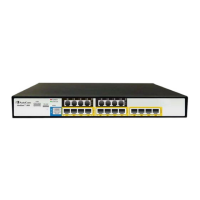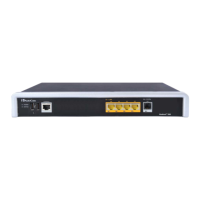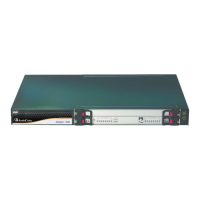User's Manual 730 Document #: LTRT-10632
Mediant 800B Gateway & E-SBC
Parameter Description
Large; [414] Request URI Too Long; [415]
Unsupported Media; [420] Bad Extension; [421]
Extension Required; [423] Session Interval Too
Small; [480] Unavailable; [481] Transaction Not
Exist; [482] Loop Detected; [483] Too Many Hops;
[484] Address Incomplete; [485] Ambiguous; [486]
Busy; [487] Request Terminated; [488] Not
Acceptable Here; [491] Request Pending; [493]
Undecipherable; [500] Internal Error; [501] Not
Implemented; [502] Bad Gateway; [503] Service
Unavailable; [504] Server Timeout; [505] Version
Not Supported; [513] Message Too Large; [600]
Busy Everywhere; [603] Decline; [604] Does Not
Exist Anywhere; [606] Not Acceptable; [805]
Admission Failure; [806] Media Limits Exceeded;
[818] Signalling Limits Exceeded.
34.4 Configuring SBC Routing Policy Rules
The Routing Policies table lets you configure up to 41 Routing Policy rules. A Routing
Policy determines the routing and manipulation (inbound and outbound) rules per SRD in a
multiple SRD configuration topology. The Routing Policy also configures the following:
Enables Least Cost Routing (LCR), and configures default call cost (highest or lowest)
and average call duration for routing rules that are not assigned LCR Cost Groups.
The default call cost determines whether matched routing rules that are not assigned
Cost Groups are considered as a higher or lower cost route compared to other
matching routing rules that are assigned Cost Groups. If you disable LCR, the device
ignores the Cost Groups assigned to the routing rules in the IP-to-IP Routing table.
Assigns LDAP servers (LDAP Server Group) for LDAP-based routing. IP-to-IP routing
rules configured for LDAP or CSR (Call Setup Rules) queries use the LDAP server(s)
that is assigned to the routing rule's associated Routing Policy. You can configure a
Routing Policy per SRD or alternatively, configure a single Routing Policy that is
shared between all SRDs.
The implementation of Routing Policies is intended for the following deployments only:
Deployments requiring LCR and/or LDAP-based routing.
Multi-tenant deployments that require multiple, logical routing tables where each
tenant has its own dedicated ("separated") routing (and manipulation) table. In such
scenarios, each SRD (tenant) is configured as an Isolated SRD and assigned its own
unique Routing Policy, implementing an almost isolated, non-bleeding routing
configuration topology.
For all other deployment scenarios, the Routing Policy is irrelevant and the handling of the
configuration entity is not required as a default Routing Policy ("Default_SBCRoutingPolicy"
at Index 0) is provided. When only one Routing Policy is required, the device automatically
associates the default Routing Policy with newly added configuration entities that can be
associated with the Routing Policy (as mentioned later in this section, except for
Classification rules). This facilitates configuration, eliminating the need to handle the
Routing Policy configuration entity (except if you need to enable LCR and/or assign an
LDAP server to the Routing Policy). In such a setup, where only one Routing Policy is
used, single routing and manipulation tables are employed for all SRDs.

